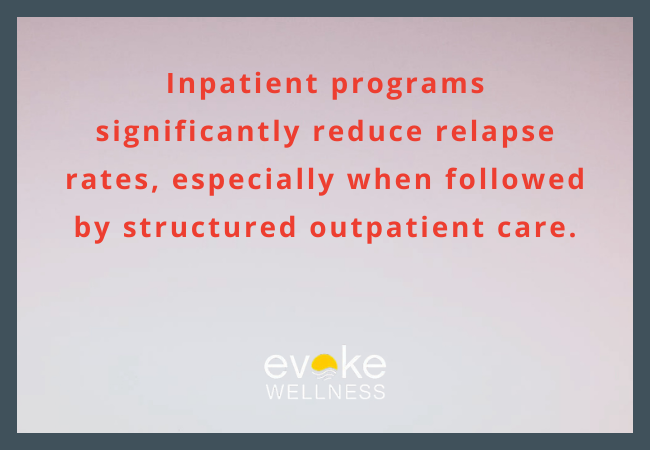The journey to long-term recovery is as much about healing the mind and body as it is about learning to live a new life. Addiction doesn’t happen in a vacuum—it’s influenced by trauma, environment, biology, and personal history. That’s why treatment needs to be comprehensive, immersive, and deeply personalized. For many, inpatient rehab provides the structure, safety, and support necessary to make lasting change.
At Evoke Wellness at Cohasset, inpatient treatment is designed to address every layer of addiction and mental health. Here, individuals are not just removed from the chaos of substance use—they’re placed in an environment built for recovery, growth, and renewal. While there are multiple pathways to healing, inpatient rehab offers unique advantages that make it one of the most effective options for achieving long-term sobriety.
What Is Inpatient Rehab?
Inpatient rehab, also known as residential treatment, is a highly structured program where individuals live on-site for a set period—typically between 30 and 90 days, or longer depending on need. During this time, clients receive:
-
24/7 medical and emotional support
-
Daily therapy and psychiatric care
-
A distraction-free, drug- and alcohol-free environment
-
Holistic and evidence-based treatment approaches
-
Relapse prevention training and discharge planning
It’s a full-time commitment that removes clients from triggers, allows for intensive healing, and sets the stage for sustained recovery.
Structure and Stability in the Early Days of Recovery
One of the most immediate benefits of inpatient rehab is the structure it provides. For someone coming from a life of substance use, chaos and unpredictability are often the norm. In contrast, inpatient rehab offers a consistent, supportive schedule from morning until night—providing meals, therapy sessions, recreational activities, and rest periods, all carefully designed to stabilize the nervous system and restore a sense of normalcy.
This environment is especially valuable for individuals dealing with co-occurring mental health conditions. Through Dual Diagnosis Treatment in Massachusetts, clients can address not only substance use but also anxiety, depression, PTSD, or other mental health concerns. This integrated care is essential, as untreated mental illness can be a major trigger for relapse.
Inpatient rehab ensures that every aspect of an individual’s well-being is cared for—not just the addiction, but the underlying causes, emotional wounds, and mental health challenges that often accompany it.
Safe, Supervised Medical Detox
Before healing can begin, the body needs to be cleared of drugs or alcohol—a process that can be uncomfortable, painful, and even dangerous without medical support. Inpatient programs typically begin with medically supervised detox, where clients are monitored 24/7 by a team of doctors and nurses. Medications may be provided to ease withdrawal symptoms and reduce the risk of complications.
Medical Detox Programs in Massachusetts offer this life-saving first step in recovery. Whether someone is detoxing from alcohol, opioids, benzodiazepines, or stimulants, professional care ensures they are safe and as comfortable as possible. The emotional toll of detox is also addressed, with therapists and support staff available to help clients manage anxiety, cravings, and fear.
Detox is more than a physical process—it’s an emotional and psychological reset. Without inpatient care, this process can be so overwhelming that many people relapse before they’ve even had a chance to begin recovery. That’s why detox within a residential setting can be a powerful and effective launchpad toward long-term success.
Protection from Triggers and Negative Influences
One of the greatest threats to early recovery is exposure to environmental triggers. These include people, places, and situations that remind an individual of their substance use—and can quickly lead to relapse. Inpatient rehab provides complete separation from those triggers, creating a secure environment where recovery is the only focus.
This separation gives individuals the space to think clearly, examine their patterns, and begin learning new ways of coping without substances. It also allows time to build internal resilience before reentering the outside world. In an Intensive Inpatient Program in Massachusetts, this round-the-clock protection is essential—particularly for those who have experienced multiple relapses or have not responded to outpatient treatment.
By being removed from stressors and distractions, clients can fully focus on therapy, self-exploration, and skill-building. It’s an opportunity to rediscover identity and purpose outside of addiction.
Community and Accountability
Addiction thrives in isolation, and recovery blossoms in connection. Inpatient rehab offers a unique opportunity for clients to build relationships with others who are also on the path to healing. These relationships often become a source of inspiration and accountability throughout the recovery journey.
Group therapy, peer support, and shared living spaces help create a sense of camaraderie and mutual respect. Individuals learn that they are not alone in their struggles—and that others truly understand what they’re going through. These peer interactions also build essential social skills, emotional intelligence, and empathy.
This sense of community is reinforced by staff members who provide consistent guidance, encouragement, and structure. In many cases, clients form lasting bonds not only with their peers but with counselors and therapists who walk with them through every step of the process.
Whole-Person Healing: More Than Just Sobriety
Addiction affects every aspect of a person’s life—physical health, emotional well-being, relationships, spirituality, and even career. That’s why the best inpatient rehabs, like Evoke Wellness at Cohasset, take a holistic approach to healing. Recovery here is about more than just stopping the use of substances—it’s about rebuilding a life that feels worth living.
Clients may participate in fitness programs, meditation, art therapy, trauma-informed therapy, nutrition planning, and life skills training. These modalities are integrated into daily schedules to promote healing of both the body and the mind.
Those struggling with alcohol dependence often need specialized care due to the physical risks of withdrawal and the emotional grip alcohol can hold. That’s where an Alcohol Detox Program in Massachusetts becomes essential. This targeted approach helps clients detox safely while addressing the psychological components of alcohol use and preparing them for deeper therapeutic work.
Building Skills for a Sober Life
Inpatient rehab isn’t just about healing—it’s also about preparing. Once a person leaves the safety of the treatment center, they’ll face the real-world challenges of staying sober. That’s why inpatient programs focus heavily on education, planning, and relapse prevention.
Clients receive counseling in areas like communication, stress management, time management, and conflict resolution. They also learn to identify triggers and develop strategies to cope with them. Each client leaves with a personalized aftercare plan that includes referrals to outpatient therapy, sober living, 12-step meetings, or continued clinical support.
This focus on long-term planning is especially impactful in a Residential Treatment Program in Massachusetts, where extended stays allow individuals the time and space to develop new habits, routines, and mindsets. The goal is to ensure that recovery continues outside the walls of the rehab center—and that each client feels empowered to live a full, sober life.
Who Benefits Most from Inpatient Rehab?
Inpatient rehab may be the best choice if you:
-
Have a history of relapse
-
Struggle with co-occurring mental health issues
-
Live in an unsupportive or triggering environment
-
Experience strong physical dependency on drugs or alcohol
-
Need structured, intensive care to break the addiction cycle
-
Have tried outpatient treatment with limited success
Support for Drug Addiction Recovery
Drug addiction presents its own set of challenges. Whether someone is addicted to opioids, cocaine, meth, or prescription medications, the effects are often devastating. Inpatient rehab provides the intensive support and medical care needed to stabilize clients and begin the healing process.
A dedicated Drug Rehab Program in Massachusetts ensures that individuals receive specialized treatment that considers the type of substance, the duration of use, and any co-occurring mental health concerns. Therapy may include cognitive-behavioral therapy, trauma-informed care, medication-assisted treatment, and family therapy.
For many, inpatient rehab becomes the first time they’ve ever experienced true safety and stability. It becomes a turning point—a foundation on which a new life is built.
Why Choose Evoke Wellness?
At Evoke Wellness at Cohasset, we believe that every person has the capacity for transformation. Our inpatient rehab program is designed to meet you with compassion, expertise, and unwavering support. From the moment you arrive, our team works with you to understand your needs, your story, and your goals.
Our clinicians, therapists, and recovery staff provide individualized care in a safe and welcoming environment. Whether you need detox, mental health support, or intensive therapy, we are here to walk beside you. Healing happens here—and you don’t have to do it alone.
Conclusion
Inpatient rehab is more than a treatment option—it’s a chance to start over. It offers a safe place to detox, uncover root causes of addiction, build coping skills, and reimagine a future without substances. While outpatient and other levels of care have value, inpatient rehab provides the intensity, immersion, and support that many people need to truly recover.
If you or a loved one is ready to begin that journey, Evoke Wellness at Cohasset is here for you. Call us today at 866.931.6429 and take the first step toward the life you deserve.
Frequently Asked Questions (FAQs)
What is inpatient rehab and how does it differ from outpatient treatment?
Inpatient rehab is a residential treatment program where individuals stay at the facility full-time to receive round-the-clock care. Unlike outpatient treatment, where clients attend sessions while living at home, inpatient rehab provides a structured, immersive environment that helps eliminate external triggers and distractions during the early, most vulnerable stages of recovery.
Who benefits most from inpatient rehab?
Inpatient rehab is ideal for individuals with severe or long-standing addiction, co-occurring mental health disorders, or a history of relapse. It offers a safe and intensive treatment setting that supports individuals who may struggle in less structured environments or need medical supervision during detox.
How long does inpatient rehab typically last?
The length of inpatient rehab varies depending on individual needs but generally ranges from 30 to 90 days. Longer stays are often recommended for those with complex conditions, co-occurring disorders, or multiple relapses, as extended treatment improves outcomes and reduces relapse risk.
What therapies are offered during inpatient rehab?
Inpatient rehab includes a variety of evidence-based therapies such as cognitive-behavioral therapy (CBT), individual counseling, group therapy, trauma-informed therapy, and holistic approaches like yoga, art therapy, and mindfulness. Clients also receive educational support and relapse prevention planning.
Is medical detox part of inpatient rehab?
Yes, most inpatient rehab programs begin with medically supervised detox. This is especially important for substances like alcohol or opioids, where withdrawal can be physically dangerous. Medical detox provides 24/7 care to ensure safety and comfort while preparing clients for the therapeutic phase of treatment.
Can inpatient rehab help with both addiction and mental health disorders?
Absolutely. Many inpatient rehab programs, including those at Evoke Wellness at Cohasset, offer dual diagnosis treatment to address both addiction and underlying mental health issues such as depression, anxiety, PTSD, or bipolar disorder. Treating both conditions simultaneously is essential for long-term success.





